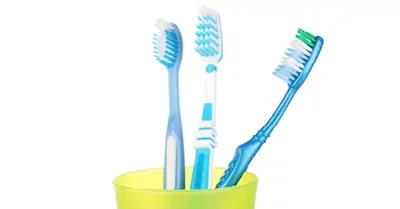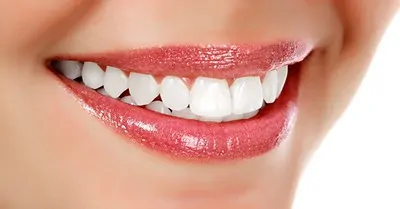Blog
New Year’s Resolutions for Better Oral Health

Resolution #1: Drink More Water
Water is incredibly important not just for your oral health, but for your whole body. But most people don’t drink nearly enough of it. It’s a generally accepted rule to drink eight, 8-ounce glasses of water every day. This ensures your body is hydrated and able to function properly. It also helps rid your mouth of dangerous bacteria and stimulates saliva flow.
Resolution #2: Quit Smoking
Although quitting smoking comes with a whole host of health benefits like decreased risk for heart disease and cancer, putting down the cigarettes helps limit your chance for oral cancer, yellow teeth, and plaque and tartar build up.
Resolution #3: Choose Fruits and Veggies
Fruits, veggies, and even nuts are packed full of antioxidants that can help combat inflammation and kill bacteria, protecting teeth and gums. A bonus is the crunchy texture of some fruits and veggies like apples and carrots remove tooth plaque and can even freshen breath.
Resolution #4: Limit Alcohol
Alcohol is naturally drying, and a dry mouth is an unhappy mouth. Saliva is your body’s natural way of rinsing away food particles, neutralizing acids, and removing plaque and bacteria. The less saliva produced and the drier the mouth, the more likely bacteria and plaque are to linger around and cause problems.
Resolution #5: Visit Your Dentist in Douglasville
We typically recommend visiting us at least every six months, sometimes more if necessary. At these visits we not only check for potential problems that may be lurking around, we also use them as a chance to make sure your resolutions are holding strong and your oral health is thanking you for it.
There’s never been a better time to resolve to get your mouth in its best shape yet. And all of us at my dental office in Douglasville want to help. Dedicate 2016 to a healthier smile and an overall healthier you. Schedule your appointment today and we’ll be with you every step of the way.
Welcoming patients from Douglasville, Lithia Springs, and Villa Rica.
2016 – It’s the Year to get Serious About Dental Health

Here are a few more ways to make your dental health part of your New Year’s’ resolution and get serious about smiling:
- Eat only at meal times. Why? For about 20 minutes after you drink or eat anything, especially sugary foods and candies, your mouth is under attack. If you tend to eat and snack throughout the day, your teeth will be exposed to harm for much longer than they should be! Try to do all your eating at once and try to choose treats that aren’t sticky or chewy.
- Remember that sweets affect more than your middle. Sugar can have devastating effects on your diet, but it isn’t good for your mouth either. Instead of sugary foods and drinks, or foods high in carbohydrates (which turn into sugar and feed bacteria too), try foods high in protein, calcium, and phosphorous like nuts, chicken, and cheese. Include crunchy fruits and vegetables for their water content and tooth-cleaning properties as well.
- If you are going to drink a lot of red wine and coffee over the holiday season, keep in mind that these are very staining. Consider scheduling a post-holiday whitening and cleaning to get your teeth back in shape after all the indulgence.
- Keep up on your regular cleanings and checkups. The more we see your teeth, the more likely we are to catch problems like gum disease, oral cancer, cavities, and other wear and tear. That means more saved teeth and more saved money as well!
- Don’t get lazy about your home hygiene routine either. Be sure to brush and floss twice a day and more often if you are snacking a lot. remember that your oral health affects your whole-body health.
If you have any questions or concerns, please call my Douglasville dental practice today. We are here to help our Douglasville, Lithia Springs, and Villa Rica friends and neighbors find better health and stronger smiles in the new year.
The Night Fight – Getting Rid of the Grind

What Exactly is a Nightguard?
A nightguard works almost exactly like a sports mouthguard – it protects your teeth and prevents painful damage. It is small and portable and most patients find them very easy and comfortable to wear. In fact, most of our patients love them because of the relief and peace of mind they offer.
The Symptoms of Tooth Grinding and Clenching
While all of these do not necessarily indicate that you are bruxing or grinding at night, they are a pretty good clue! If you experience any of the following symptoms, please give my Douglasville dental office a call:
- Worn, chipped, broken teeth
- Flattened tooth surfaces
- Exposure of tooth layers and loss of enamel
- Tooth sensitivity
- Jaw pain
- Headache and facial pain
- Earache from jaw muscle tension and contraction
- A scalloped tongue or irregular tongue edges
- Damaged mouth tissue
Bruxism can also cause micro fracturing and sensitivity at the gum line, and it can even lead to chronic headaches and TMJ disorder. Not something we want our patients to deal with – ever!
Why am I Grinding my Teeth?
It can be hard to pinpoint the cause: It might be a result of a car accident or other injury. Sometimes chronic stress or medical conditions, such as sleep apnea, can trigger bruxism. Other times it is caused by poorly balanced dental work or missing teeth. Whatever the cause, if you clench or grind your teeth, you could be facing a long list of dental problems, including the painful effects of TMJ disorder or arthritis of the temporomandibular joints.
Let Us Help
I’d love to help you protect your teeth and let you get a truly relaxing night’s sleep. At my Douglasville dental office, my team and I can fit you with a custom-made nightguard appliance that will reduce the damage to your teeth and protect your dental investments! If you think you might grind your teeth at night, call us today!
We welcome patients from Douglasville, Lithia Springs, and Villa Rica.
The Importance of Proper Denture Care

Dentures Deserve Care, Too!
At my Douglasville dental office, we’re here to educate our patients on oral health and provide tips on how to keep mouths healthy. When it comes to our denture wearers, it’s no different. Even though dentures are not natural teeth, is doesn’t mean they don’t require just as much care. Proper denture care is crucial to maintaining the life of the appliance and to sustain oral health.
Often times if dentures aren’t cared for properly, plaque builds up and creates some serious concerns. When left alone, the plaque can cause additional tooth loss, bad breath, and even gum disease.
How to Properly Care for Dentures
- Handle with Care. Dentures are an investment in your oral health. They’re also pretty fragile, so handle them as carefully as possible to reduce risk of damage or needing repairs.
- Rinse Well. After every meal, rinse your dentures with water to remove any loose food particles. If left there, the particles can lead to bad breath or gum disease.
- Brush ‘Em. Brush your dentures daily for the best care possible. Select a soft-bristled brush or a denture-specific brush to decrease the chance of damage. Also, make sure to use a denture-safe cleanser.
- Let Them Soak. Dentures need to remain moist and hydrated. Whenever your dentures aren’t in your mouth they should be soaking in water or a solution recommended by your doctor.
- Visit Often. Maintain regular visits with your dentist in Douglasville to ensure there are no potential problems and your dentures are fitting and functioning properly.
If you already have dentures and want to make sure they’re in the best shape possible, or if you think dentures may be a good fit for you, give my dental office in Douglasville a call. We’re here to provide you the best solution for your missing teeth and will develop a personalized treatment just for you.
Serving patients from Douglasville, Lithia Springs, and Villa Rica.
Healthier Mouth, Healthier You

The Mouth/Body Connection
Many systemic diseases (whole-body diseases) have oral manifestations and often first show signs in the mouth. Some of these overall health problems are incredibly serious, such as:
- Heart disease
- Pancreatic cancer
- Leukemia
- Diabetes
Notice Any of These Signs?
If you see any of these symptoms, it’s important to call your Douglasville dentist as soon as possible. Early detection is key for the most successful treatment, so don’t wait. Serious signs include:
- Swollen, red, or bleeding gums
- Gums that have pulled away from teeth
- Chronic bad breath
- Ulcers
Steps to Better Health
In addition to a proper, at-home hygiene routine and regular dental visits, there are several ways you can help protect your smile against dangerous bacteria, and your body against serious disease.
- Water, water, water. When it comes to choosing your beverage of choice, select water whenever possible. It helps rinse away bacteria and acid in the mouth and hydrates your body.
- Say no to tobacco. Besides the effects smoking or chewing tobacco can have on your smile, using any form of tobacco can lead to overall health complications.
- Practice proper nutrition. Eating well-balanced meals is important for proper body function as well as optimal oral health. Avoid snacking throughout the day, especially sticky, sugary foods.
Your dentist could be the first line of defense against many serious diseases. If you’re experiencing any of the signs above, or if you haven’t seen a dentist in awhile, give my Douglasville dental office a call. We’ll perform a thorough exam, talk with you about any potential problems we find, and stand with you through your individualized treatment plan. Your health is the most important thing to us, and we’ll help any way we can.
Welcoming patients from Douglasville, Lithia Springs, and Villa Rica.
Sleeping and Your Oral Health

Here are two-night time habits, or issues, and the solutions that may save your teeth:
Snoring and Sleep Apnea
Not only is snoring a possible sign of sleep apnea, a potentially deadly disorder that disrupts your sleep, it’s also a common cause of dry mouth. Everyone needs saliva to keep their mouths healthy. Saliva works to:
- Lubricate the tissues of your mouth
- Cleanse and rinse the oral cavity and teeth, minimizing plaque build-up, washing away trapped food particles, and removing dead cells that can lead to bad breath, infections, and sores.
- Neutralize the acids plaque produces to stop enamel erosion.
If you snore or wonder if you have sleep apnea, please call us or talk to your physician or dentist right away. Sleep apnea won’t just dry your mouth out, it can lead to all kinds of health problems from extreme fatigue to an increased risk for strokes and heart attacks.
Grinding or Bruxism
Stress, certain medications, and dental problems can all cause people to grind and clench their teeth during sleep, a disorder called bruxism. Bruxism seems pretty self explanatory in the fact that it can cause your teeth to break, chip, crack, and even decay because of enamel erosion, but did you know it can also lead to a variety of other problems?
Problems caused by bruxism may include:
- Headaches, especially in the morning
- Toothaches
- Facial pain
- Jaw pain and dysfunction sometimes known as TMJ disorder
- Gum disease
- Facial aging due to shortening of teeth
- Tooth damage
If you or someone you know grinds or clenches their teeth at night, please call my dental office in Douglasville. We’ll work with you to diagnose what’s going on in your mouth and recommend the best solution for you so you can get back to oral health and back to a good night’s sleep.
Welcoming patients from Douglasville, Lithia Springs, and Villa Rica.
Dentistry Through The Ages

But imagine if you lived 200 hundred years ago. What was dentistry like then? How about during the middle ages? Would the dentists of those times have been able to replace your lost tooth? Would they have been able to fill a cavity? What would they have recommended you do for a toothache?
Let’s take a look.
Dentistry in the middle ages
For the common folk, dentistry consisted mostly of self-care and occasional visits to practitioners or barber surgeons who treated a toothache by pulling the offending tooth and suggested things like kissing a donkey to cure the toothache. It also wasn’t unheard of to recommend concocting a mixture of newts, lizards, and beetles into a powder and applying it to the painful tooth throughout the day.
The truth is, in spite of inconsistent professional care, most medieval commoners had clean, white teeth. Why? Their diets were similar to what a modern dentist would recommend for a healthy mouth: One very low in sugar and refined flours and high in calcium. They also used all kinds of fairly effective tooth cleaners and mouth rinses, including a paste made from crushed peppermint and rock salt.
Dentistry in the 19th Century
Dentistry didn’t begin to resemble what we think of as dentistry today until the early 18th century, and by the 19th century, dentistry began to seem quite modern. European surgeons had begun experimenting with implanting teeth; dentures were being created out of both human teeth, the teeth of animals, and porcelain; and nitrous oxide, the same laughing gas we sometimes use today, was introduced by Humphry Davy around 1800. In 1840, the Baltimore College of Dentistry, the first dental college, was founded by Chapin Harris and Horace Hayden. It was the first step into dentistry as we know it today.
Our Dentistry
At my Douglasville dental office, we’ve continued to adapt and improve our services as the advancements in dental care improve. We always ensure the utmost in comfort, technology, and service. To schedule an appointment and experience the difference, give us a call today!
Welcoming patients from Douglasville, Lithia Springs and Villa Rica.
What’s Your Excuse? Top Reasons People Aren’t Flossing

So, What’s the Deal?
There are several reasons people aren’t flossing on a regular basis. Check out a few of the more common ones below.
They Don’t See The Point.
Flossing reaches places in your mouth that a toothbrush can’t. While brushing your teeth is still absolutely important in maintaining proper oral health, if you skip flossing, all of the spaces in between teeth are left uncleaned. With so many people forgoing the floss on a regular basis, it’s no surprise that most cavities are found in these exact spots. What’s more, flossing your teeth helps remove bacteria from below the gum line which can help reduce the risk of gum disease. Gum disease is an incredibly serious problem that can actually affect the whole body by increasing the risk of stroke and heart attack.
They Aren’t Sure How to Floss Correctly.
Although it seems pretty straightforward, there is a right way and wrong way to floss. Flossing will be uncomfortable if you’re not sure how to do it right. But we promise, it’s easy. Just follow the American Dental Association’s steps to successful flossing:
- Use about 18 inches of floss. Wrap the ends around each middle finger.
- Tighten the floss and wiggle it in between the space between teeth using a back and forth motion.
- When it reaches the gum line, form the floss into a “U” around the shape of the tooth.
- Press gently and glide the floss in an up and down motion.
- Repeat between each tooth, unwrapping a new, clean section of floss.
They Have Pain or Bleeding.
There’s a common misconception that if flossing hurts, you should stop. The truth is quite the opposite. If flossing is a bit painful, it’s actually a sign of not flossing enough. Additionally, if gums bleed, it could be a sign of gum disease. Even if flossing isn’t so comfortable, it’s important to get into the habit of doing it regularly. Like exercising, it hurts less the more you do it.
If you’re having trouble flossing, or are experiencing pain or bleeding when you do, give my Douglasville dental office a call as soon as possible. We’ll work with you to find a flossing solution that works well for you and your health. And if we happen to find signs of a more serious problem, we’ll create an individualized plan to treat it.
Serving patients from Douglasville, Lithia Springs, and Villa Ricca.
Combat Bad Breath with These 4 Tips

What Causes Bad Breath?
At my dental practice in Douglasville, we know bad breath can be caused by a lot of things, including some types of food and drink. That type of bad breath usually dissipates fairly quickly and isn’t something to worry about. However, when bad breath tends to linger day in and day out, you should give us a call.
Chronic bad breath (halitosis), meaning bad breath that does not go away after brushing, flossing, and rinsing, is typically an indicator of a bigger problem. Halitosis means there is a buildup of bacteria in the mouth. Those bacteria live and feed off tooth plaque, and when they feed, hydrogen sulfide is produced and gives off a malodorous stench. Bad breath is also a top sign of gum disease – a serious concern for your mouth and your body.
Gum disease may also affect your overall health. Untreated gum disease has been shown to cause loose teeth, receding gums, and sensitivity, as well as increase the risk of heart attack, stroke, and diabetic complications.
How to Get Rid of Bad Breath
If you suffer from bad breath, there are few tips you can try.
- Proper Oral Hygiene. Maintaining a proper oral hygiene routine of brushing twice a day and flossing at least once a day can work wonders to keep your mouth fresh and bacteria free. Make sure each time you brush it’s for about two minutes (hum “Happy Birthday” twice!) and that you reach each surface of each tooth. When flossing, it’s important to clean in between each tooth and under the gum line where bacteria love to hide.
- Tongue Scraping. Your tongue can hold a lot of bacteria in each of its tiny bumps and grooves, which is why it’s important to gently scrub it each time you brush. Some patients have difficulty cleaning their tongues with a traditional toothbrush because it makes them gag. If this is a problem for you, try using a tongue scraper instead.
- Water, Water, Water. Drinking plenty of water every day can also help keep your mouth stink free. Water keeps your mouth hydrated and rinses away bacteria. If you slack on your H₂O intake, your mouth could become dehydrated. When this happens, less saliva is produced and bacteria isn’t cleared away.
- Your Dentist. Bad breath shouldn’t be treated lightly. If you notice a lingering odor, call my Douglasville dental office as soon as possible. We’ll work with you to determine the cause and talk about the best treatment for you. We also won’t lecture you or make you feel embarrassed. We’re here to help keep your smile and your body healthy.
Accepting patients from Douglasville, Lithia Springs, and Villa Rica.
Osteoporosis Diagnosis from Your Dentist?

What is Osteoporosis?
Osteoporosis is a bone disorder that reduces bone density and causes them to weaken. While it typically affects women who are 50 or older, osteoporosis can happen to anyone. Currently, 10 million Americans suffer from osteoporosis and another 34 million are at risk for developing it. When your bone density weakens, your body becomes much more susceptible to serious, life-threatening bone breaks.
Signs
Some of the signs of osteoporosis may go unnoticed for a while, and many individuals don’t realize they have a problem until the osteoporosis causes a serious break or fracture. However, many signs of osteoporosis show up first in the mouth, since it’s the only part of your body that is x-rayed so regularly!
Some of the signs your dentist look for include:
- Bone loss around teeth and in the jaw
- Tooth loss — without the strong bone, teeth are more likely to fall out
- Gum disease
- Low bone density in x-rays
The earlier osteoporosis is caught, the earlier treatment can begin and the risk for serious injury decreases.
Prevention
- Get enough calcium and vitamin D through your diet or supplements
- Move it, move it! Exercise, particularly muscle-building exercises, can help
- Put down the cigarettes
- Limit alcohol
- Decrease caffeine intake
- Maintain regular dental appointments
Keeping up with regularly scheduled appointments at my Douglasville dental office is important not only for your oral health, but for your whole body’s health too. At every visit, we’ll monitor your mouth for any signs of osteoporosis. If we suspect osteoporosis, we’ll work with you to find the best treatment.
Serving patients from Douglasville, Lithia Springs, and Villa Rica.
